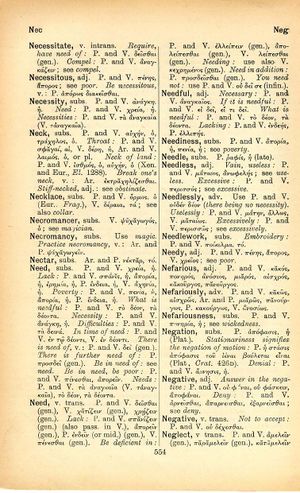negative: Difference between revisions
From LSJ
γραμματική ἐστιν ἐμπειρία τῶν παρὰ ποιηταῖς τε καὶ συγγραφεῦσιν ὡς ἐπὶ τὸ πολὺ λεγομένων → grammar is a practical knowledge of the usage of poets and writers of prose
(D_6) |
(Gf-D_6) |
||
| Line 1: | Line 1: | ||
{{Woodhouse1 | {{Woodhouse1 | ||
|Text=[[File:woodhouse_554.jpg|thumb|link= | |Text=[[File:woodhouse_554.jpg|thumb | ||
|link={{filepath:woodhouse_554.jpg}}]]'''adj.''' | |||
<b class="b2">Answer in the negative</b>: P. and V. οὐ φάναι, οὐ φάσκειν, ἀποφάναι. | <b class="b2">Answer in the negative</b>: P. and V. οὐ φάναι, οὐ φάσκειν, ἀποφάναι. | ||
<b class="b2">Deny</b>: P. and V. ἀρνεῖσθαι, ἀπαρνεῖσθαι, ἐξαρνεῖσθαι; see [[deny]]. | <b class="b2">Deny</b>: P. and V. ἀρνεῖσθαι, ἀπαρνεῖσθαι, ἐξαρνεῖσθαι; see [[deny]]. | ||
Revision as of 07:25, 14 August 2017
English > Greek (Woodhouse)
adj.
Answer in the negative: P. and V. οὐ φάναι, οὐ φάσκειν, ἀποφάναι. Deny: P. and V. ἀρνεῖσθαι, ἀπαρνεῖσθαι, ἐξαρνεῖσθαι; see deny. v. trans. Not to accept: P. and V. οὐ δέχεσθαι.
Latin > French (Gaffiot 2016)
nĕgātīvē, (negativus) négativement : Cassiod. Lib. litt. De rhet. arg. 3 ; Boet. Top. Cic. 5.

